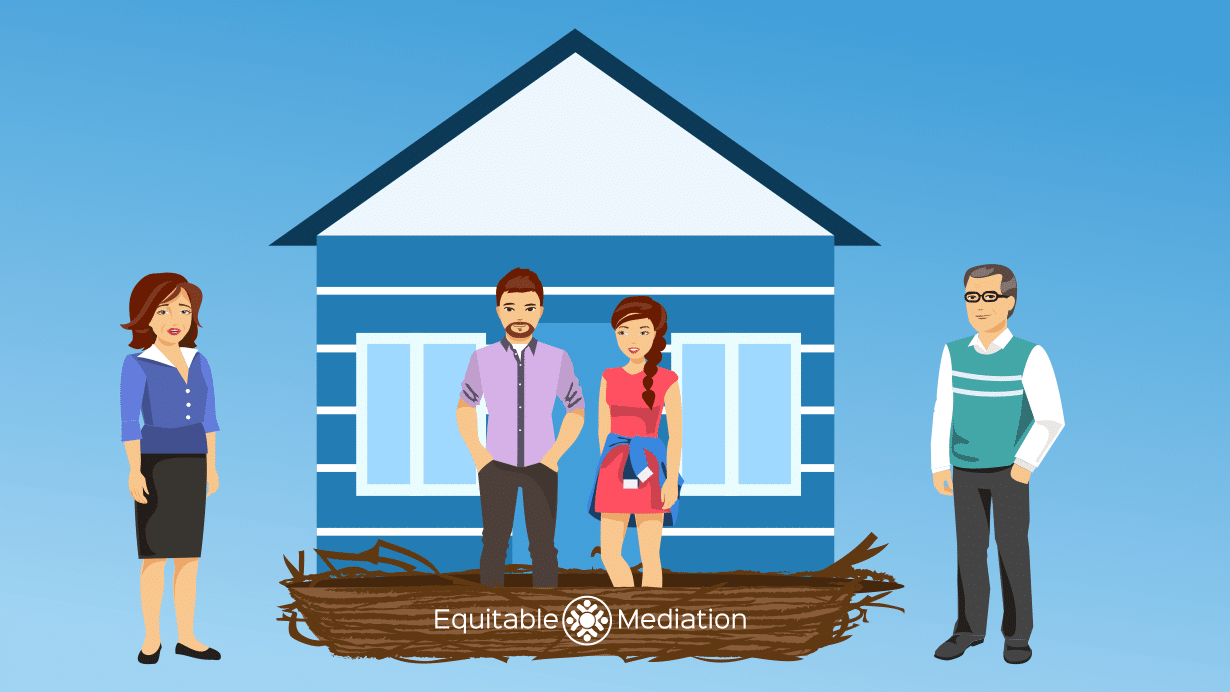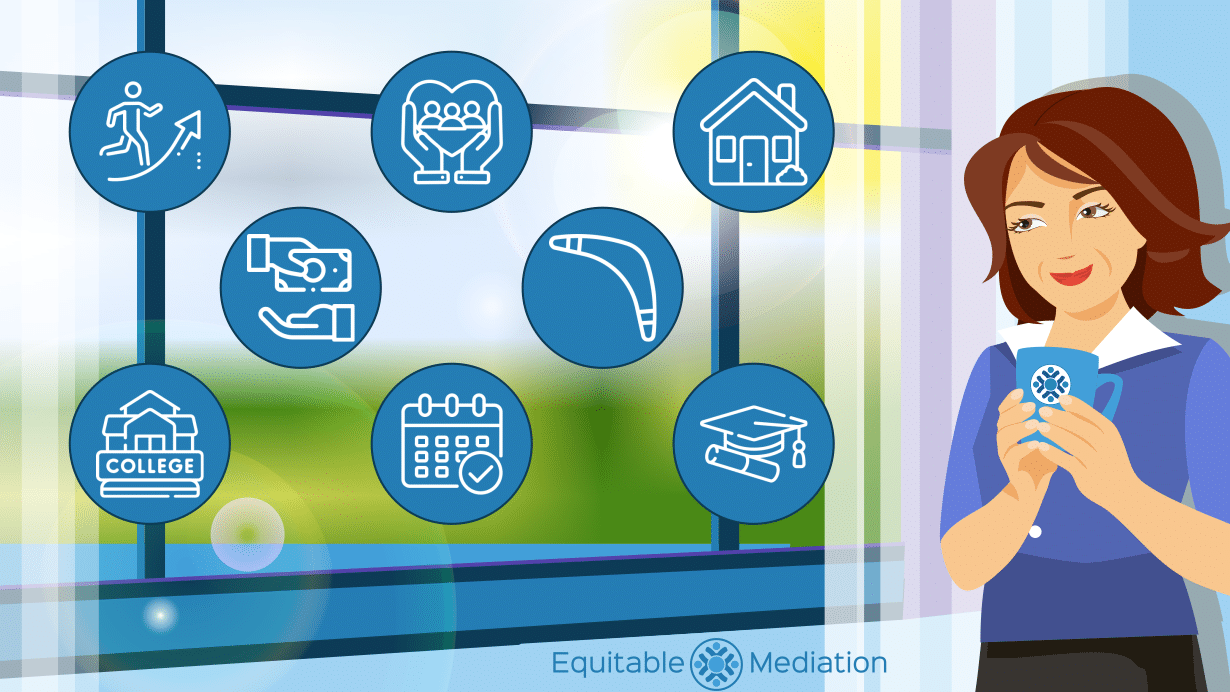When couples come to me seeking a divorce after 20 years, I’ve noticed there’s often this sense of calm acceptance between them. They’ve raised their kids, they’ve lived full lives together, and now they’re realizing they want different things for their future.
It’s not that these divorces hurt any less – they absolutely do – but there’s usually this mutual understanding that as a couple, they’ve simply grown in different directions. Why is that? I believe it’s because as we hit our late 40s / early 50s, we suddenly realize life is too short to not be living it exactly as we want. So we look to make a significant change which comes in the form of ending our marriage.
While these divorces tend to be more peaceful, they come with their own unique set of challenges that need careful navigation.
So in this post, I’ll walk you through everything I’ve learned as a mediator about making this transition as smooth as possible, and share strategies that have helped the countless couples I’ve worked with who are divorcing after 20 years of marriage start their next chapters with confidence.
Before we begin – Why do people divorce after 20 years of marriage?

You would think that after sharing so much of their life together, a couple would stay committed until the end. But it’s not uncommon for one or both spouses to discover after spending two decades or more together, they’ve grown in different directions. And there’s a very real and common reason why this happens.
You see, as children become more independent and couples find themselves with more free time, many people start to reconnect with themselves in ways they never expected. And find they no longer want what they currently have.
They seek personal growth
Think about it – when was the last time you truly explored your own interests? Many husbands and wives spend their entire marriage taking care of their family, pursuing careers, and putting everyone else’s needs first. While setting aside their personal dreams and passions. Suddenly, with kids grown and responsibilities shifting, there’s space to ask yourself big questions like: Who am I now? What do I want from life? And where do I go from here?
These moments of self-discovery can be both exciting and challenging, especially when they reveal that you and your spouse may have grown apart and there’s no longer an emotional connection. In cases like these, it’s not about infidelity, trust issues, or the failure of the other person to make you happy.
Instead, it’s about hope and the courage to embrace your future goals so you can make you happy. And it’s on this journey that people discover new interests, make new friends, and realize they’re craving a different kind of relationship. One that truly reflects who they’ve become. And with someone other than their spouse.
The challenges of divorce after 20 years of marriage
Let’s now take a closer look at how divorcing after 20 years of marriage (or more) can impact the specific parental and financial issues you’ll face and what you can do to address them.
Parental issues:

How your children will take the news of your divorce after 20 years
Chances are good you have teenagers and deliberately waited until the kids were older thinking it was in their best interest. For the older couples I’ve worked with, this is the #1 reason why they waited get a divorce.
As I’m sure you know, teenage years are unique in your child’s development. The focus of their life is no longer on the home and you their parents, but on their own new hobbies and interests, school, peers and independence. Making them very critical about your divorce – to put it mildly – with a common refrain being “how could you do this to me!?”
Hurt feelings aside (theirs and yours) you need to be prepared for this possible reaction so you can provide the necessary emotional support to help your kids cope with the divorce. Some people feel it’s helpful for kids to participate in both family therapy as well as individual counselling – despite them telling you “I’m fine!” – to help them manage their emotions and ease the transition.
Crafting your parenting plan
Negotiating a set, repeating schedule and maintaining a united front as parents when divorcing after 20 years is critical to ensuring children’s well being. Despite their protests to the contrary, kids need routine and to understand boundaries. Having a parenting plan in place can offer both you and them a sense of calm and structure.
Many of the parents I work with insist they don’t need a parenting plan; instead allowing their children to decide with whom they’ll live, and when they’ll visit the other parent. And while giving your kids some autonomy may seem like a good idea, the lack of structure can lead to issues between parents and children. As kids will choose either the parent they like better (creating a division between you and your now ex-husband or ex-wife) or the one that lets them get away with whatever they want!
If you want to sit with them, talk to them, and ask them what kind of parenting time arrangement they’d like, that’s fine. But remember you are the adults and setting the schedule is up to you. In my experience a “one week on, one week off” schedule tends to work best for teenagers with a changeover on either Friday or Sunday night.
Financial issues:

What to do with your marital home (if you own one)
Many parents of teenagers tell me “we want to keep the house for the sake of the children so we can minimize the upheaval the divorce will have on their family life and schoolwork.” Which makes perfect sense as chances are your kids are in high school, and have known the same group of friends for more than a decade.
But since the house is typically the most significant marital asset a couple like you owns, it means you need to figure out how to financially support two separate households: with one of you staying in the marital home while the other finds another place to live. Unless, of course, you decide to both remain in the marital home for some time after your divorce. And that comes with other challenges.
One possibility parents are considering to achieve this goal – and it’s something we’re seeing more these days given the cost of housing and interest rates – are nesting plans. But to see if it’s even a possibility, you’ll need to create a budget that captures the expenses of keeping the marital home and possibly renting a second residence. If you need some help doing so, check out our pre-divorce financial preparation kit.
The complexity of child support for teenagers
For couples divorcing after 20 years, child support can get complicated when children approach college age. Most state guidelines adjust support based on the number of children, meaning support will likely decrease as each of your kids leaves home. But unless you’ve got one of those kids who never comes home on holidays or summer break, most college students I know spend up to 22 weeks a year at home. And while they’re there, still incur expenses that don’t disappear when child support changes.
One strategy I suggest to my client couples is to consider a reduced amount of child support for their college aged child(ren) to ensure their needs continue to be met regardless of whether they’re living at home, or have left home and are living on campus.
And if your kids are still in high school? Since teenagers expenses are far greater than younger children, that will require some careful planning too. One approach I use to address this for couples with teenagers is to negotiate a higher than guideline recommended child support amount to ensure their kids expenses are adequately covered. Unless your state like New Jersey’s child support guideline already factors that in.
As you’re learning, in cases of a long marriage like yours, child support conversations require far more thought and care than just running a guideline calculator and accepting the output.
Changes to how the length of alimony / spousal support is determined
In the past, it was common for couples divorcing after 20 years of marriage, to have an alimony agreement that required one partner to pay their former partner in perpetuity (aka permanent alimony.) But these days that’s typically no longer the case.
For example, alimony reform in New Jersey included a provision that for marriages that last 20 years or less, the length of alimony payments cannot exceed the length of the marriage unless a judge decides that there are exceptional circumstances. So in the past, a former spouse who got divorced after a 20 years marriage might have been eligible to receive permanent alimony. But today, there are no guarantees.
To help my client couples negotiate this thorny issue, I approach this from a variety of angles. Factoring in things like each party’s needs, age, ability to earn an income, where will the children be living, and even what their Social Security earnings or property division agreement looks like to help them determine duration.
Unfortunately, unlike child support where each state is required to have a guideline, there are no such requirements for alimony. How it works and how it’s determined isn’t always clear, and is subject to negotiation. Which as you’ll learn later in this post is why it’s so important to mediate your divorce.
The challenges of divorce after 25 years
Similar to a 20 year divorce, divorce after 25 years, will center around issues related to children and finances. But a lot can happen in those additional 5+ years. Chances greatly increase that most (if not all) children are in college, and some may have even graduated.
Here are some issues the couples I work with encounter in a divorce after 25 years of marriage and strategies I’ve used to help address them.
Parental issues:

How your children will take the news of your divorce after 25 years
It’s a common misconception that older children take the news of their parents divorce better than young children. When in fact, the opposite is true. And if you’re getting in a divorce after 25 years, there is an excellent chance your children are no longer minors but older “adults.”
On one hand you might be tempted to think “oh well, they’re adults. They’ll get used to it.” But that can be a big mistake. Despite their insistence they’re adults, no matter how old they are, they are still your children. And will want to be treated as such. Confusing, I know…
In cases like yours, family therapy can allow all of you to discuss the life changes you’ll all be experiencing in a caring and supportive environment. By including them in the conversation you’re acknowledging their standing as adults, but can also openly express to them as their parents, how much you care for them, and want to make sure they’re OK.
Dealing with “slow to launch” children
Many children leaving home these days face significant challenges to independence, including high student loan debt and the rising cost of living. Over my decades of mediating, I’ve noticed it’s become increasingly common for young adults to return home after completing their education. This trend, often referred to as “boomeranging,” presents a real challenge for divorcing parents.
While you may not need a formal parenting plan for your adult children, some of the people I work with feel it’s important to consider the possibility their children might return home, and to plan what financial support each parent will provide as their children try to establish themselves. In mediation, we negotiate what I call “support of your children.”
Rather than using state guidelines to determine child support (as you would with minor children), we create a budget-based approach. This helps determine what costs need to be covered if you have a boomeranging child, and whether it makes sense to keep the house until you know where they’ll end up. This way, if your college graduate decides to live with one of you in the future, that parent won’t be solely responsible for providing financial support or finding space for them in that parent’s new residence.
Financial issues:

The decision to keep or sell the marital home becomes even more difficult
As we discussed there is the distinct possibility of children “boomeranging” back home once they’ve graduated college. In a divorce after 25 years, it’s extremely likely at least one of your two or three children is in college, and one (or more) may have even graduated.
If you’re facing divorce as an empty nester, you’ll need to ask yourself how important it is for your kids to return to the house they grew up in on holidays and school breaks. Or if it’s ok to sell the house now since the kids are primarily living at school for most of the year. And if they have boomeranged, where can they / you go if you decide to sell it?
Because your children are no longer minors, they may want to have a say in your decision. So don’t be afraid to include them but once again, you’re the adults and need to have the final say. Working through if this is even possible starts with a solid budget, so before you even discuss this complex issue, make sure to “do the math” to see if it’s even possible.
Buying out the marital home gets even harder
When divorcing after 25 years of marriage, there’s a good chance your house is fully or almost paid off. Meaning one of you is going to have to procure a hefty mortgage to buy the other party out or you’ll each walk away with a nice sum to put down on a place of your own after the divorce process is finished. In both of these cases, if you’re the spouse who worked inside the home raising children, getting approved for a mortgage without an income history is going to be tough. So regardless of whether or not you want to buy your spouse out of the marital home, or prefer to buy a place of your own, doing so may prove challenging.
Two options I help couples consider are delaying the sale of the home until retirement and exchanging the equity in the home for some other asset. In both of these cases, if you’re the spouse who wants to remain, you can do so without having to uproot yourself immediately after your divorce. But be careful to not only consider the financial implications, but the tactical ones as well. Homes require maintenance and upkeep so ask yourself if you really want to be cutting that grass or dealing with a leaky water heater by yourself once your divorce is final.
Alimony / spousal support and the 25 year marriage
If your role was to “work inside the home” and raise your children, chances are you’ve been out of the workforce for many years. And even if you got a job when your kids graduated high school just to keep yourself busy, it’s unlikely the money is enough to support yourself on what you take home.
Many states are allowing alimony to end upon the retirement of the paying spouse (usually age 67). That means even when divorcing after 25 years, you might only be receiving alimony for a few years which may not be enough time for you to get back on your feet and establish your own separate life.
To help with this, there are two things you can consider. First is something I call rehabilitative alimony. It’s alimony paid in addition to periodic payments that allows the receiving spouse to return to college or receive additional training to improve their future financial potential. And the second is receiving an additional share of property division in exchange for a shorter duration of alimony. Both of these options are things I explore with client couples who find themselves in this situation. So with some careful planning, and the guidance of a negotiation professional like me, perhaps it may be worth exploring.
Paying for college as a form of child support
Another interesting development is in the area of who pays for college when parents divorce after 25 years. Couples are often surprised to find out that if they remain married, they’d have no formal obligation to pay for their children’s college education. Even though they may choose to do so on their own. But when they get divorced after 25 years, in some states like Illinois and New Jersey, they may be required to contribute to college.
Be sure to come to terms on what each of your contributions to college will be (if any) and what marital assets you may use to satisfy those obligations. As I’d hate for you to both wind up like me and my parents did, litigating this issue in court. Formalizing these agreements in writing and setting aside the funds can help you avoid arguments down the road, and stay out of court.
Remember: life is short so keep the divorce process peaceful
After twenty years of marriage, you’ve built a lifetime of memories together. While your paths are now diverging, those years weren’t wasted – they were part of both your journeys, filled with shared experiences that helped shape who you are today.
Love takes many forms, and sometimes the most loving choice is recognizing when it’s time to walk separate paths. This doesn’t diminish the relationship you’ve had or the care you still have for each other. People grow and change over time, and that’s not only natural – it’s part of being human.
Choosing an amicable divorce through mediation honors both your shared past and your individual futures. It allows you to preserve the dignity of your relationship while opening the door to new possibilities. By working together one final time, you can:
- Protect the precious memories you’ve created together
- Save valuable time and financial resources for your next chapter
- Begin your healing process sooner rather than later
- Maintain mutual respect and understanding
Being closer to retirement means protecting your financial future is more important than ever. Mediation helps you avoid costly, drawn-out legal battles that drain both your emotional and financial resources. Instead, you can work together to create a thoughtful transition that respects both your needs.
When you choose mediation, you’re saying, “Our time together mattered, and how we end this chapter matters too.” It’s about acknowledging that while your love has transformed, your ability to treat each other with kindness and respect remains unchanged. This approach creates space for both of you to move forward with hope, dignity, and the excitement of discovering what your next chapter holds.
Key takeaways

- Personal growth is often the primary reason couples divorce after long marriages, as individuals rediscover themselves when children become more independent.
- Teenage and adult children can have complex emotional reactions to parental divorce, making family therapy and open communication crucial.
- Financial considerations are intricate, including decisions about the marital home, child support for teenagers and college-aged children, and potential alimony limitations.
- Many states now limit alimony duration, even for marriages lasting 20-25 years, which can create financial challenges for the spouse who was primarily a homemaker.
- “Boomerang” children (young adults returning home after college) add complexity to divorce negotiations about housing and living arrangements.
- Some states may require divorced parents to contribute to college expenses, which differs from obligations during marriage.
- Creating a structured parenting plan remains important, even with older children, to minimize potential conflicts and provide stability.
- Career counseling or returning to college can be valuable strategies for the spouse seeking to re-enter the workforce after a long marriage.






